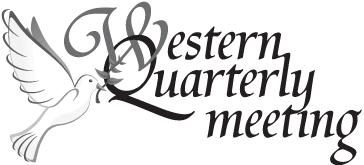Submitted by Christina Repoley
Bruce Birchard and Christina Repoley led the program for the January session of Western Quarterly Meeting on “Nurturing Seeds of Peace in a Culture of Violence.” Bruce opened their presentation by sharing from decades of experience as an active Friend, and he challenged Friends to be serious about our peace witness. There are many ways we can act for peace, and showing up for vigils and protests is just one of them. We should recognize that it is easy for most of us American Friends, generally living as we do with considerable privilege, to espouse nonviolence. For many of our sisters and brothers around the world who suffer, often terribly, from wars, personal violence and injustice, our words carry little weight if we do not act upon them, giving up some of our privilege in the process.
Bruce concluded by emphasizing that part of our mission as peacemakers is to be effective. Too often, Friends act as if power and love are incompatible with each other. He closed with this quote from Martin Luther King, Jr.: “Power without love is reckless and abusive, and love without power is sentimental and anemic. Power at its best is love implementing the demands of justice, and justice at its best is power correcting everything that stands against love.”
Christina Repoley is the founder and Executive Director of Quaker Voluntary Service. QVS provides a year-long service opportunity for young adults, drawing on the long tradition of Quaker peace and justice work. With programs in Philadelphia, Atlanta and Portland, OR, and a new program in Boston in the works, QVS provides rich opportunities for young people to serve others through work with local social service and social change organizations while living simply with other volunteers in communal houses provided by QVS.
Christina described her leading to start QVS. As a young Quaker, just out of college, she realized that many young adults who had grown up Quaker were not sticking around. She knew that a big reason was the lack of opportunities for young adult Friends to serve others in a strongly supportive Quaker context at this critical time of passage into adulthood. Knowing the transformative power of workcamps and AFSC service programs for earlier generations of Friends, Christina was inspired to create Quaker Voluntary Service
Christina reflected on the wisdom of Quaker tradition that teaches us that sowing seeds of peace is about both internal and external transformation. It is in the constant balancing of inward spiritual growth and active love for others in the real world that we create and sustain dynamic Quaker communities. She described Rufus Jones’ concept of “prophetic service,” which recognizes the brokenness in all of us and leads people into wholeness through service.
Friends then divided into several smaller groups to reflect on queries concerning the personal, spiritual and social/political aspects of sowing seeds of peace in our personal lives, our meetings, our nation and our world. In the closing discussion, Friends asked many questions about Quaker Voluntary Service. A vivid picture of QVS, with photos and bio’s of current volunteers, is available at www.quakervoluntaryservice.org.
And here is the poem Christina read at the end of her talk:
by Ken Untener for Archbishop Oscar Romero
It helps, now and then, to step back and take a long view. The kingdom is not only beyond our efforts, it is even beyond our vision. We accomplish in our lifetime only a tiny fraction of the magnificent enterprise that is God’s work. Nothing we do is complete, which is a way of saying that the Kingdom always lies beyond us. No statement says all that could be said. No prayer fully expresses our faith. No confession brings perfection. No pastoral visit brings wholeness. No program accomplishes the Church’s mission. No set of goals and objectives includes everything. This is what we are about. We plant the seeds that one day will grow. We water seeds already planted, knowing that they hold future promise. We lay foundations that will need further development. We provide yeast that produces far beyond our capabilities. We cannot do everything, and there is a sense of liberation in realizing that. This enables us to do something, and to do it very well. It may be incomplete, but it is a beginning, a step along the way, an opportunity for the Lord’s grace to enter and do the rest. We may never see the end results, but that is the difference between the master builder and the worker. We are workers, not master builders; ministers, not messiahs. We are prophets of a future not our own.
Comments are closed.